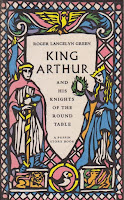
Thursday, July 27, 2023
Uncle Tom's Cabin by Harriet Beecher Stowe

Thursday, July 13, 2023
Lord Peter Wimsey Books 11-15 and One More

Thursday, June 29, 2023
What I Read and Watched in June 2023

Thursday, June 22, 2023
Introduction to the Devout Life by St. Francis de Sales

Thursday, June 8, 2023
The Story of King Arthur and His Knights by Howard Pyle
I had been
primed for Howard Pyle’s King Arthur and His Knights by two previous retellings
of the Arthurian legends (Green’s and Knowles’). But I wasn’t prepared for how
deeply I would love this third version.
From the
very first page, I was captivated by Pyle’s affection and reverence for this
legendary king. In the introduction he wrote, I believe that King Arthur was
the most honorable, gentle Knight who ever lived in the world. And those who
were his fellows of the Round Table – taking him as their looking glass of
chivalry – made, altogether, such a company of noble knights that is hardly to
be supposed that their like will ever be seen again in this world.
Truly his
heart was “stirred with a noble theme.”
Unlike the two previous authors I read, Pyle manages to weave the legends together into a cohesive and beautiful adult fairy tale, which I found enthralling and at times achingly beautiful. Because he was unconcerned with brevity (this is the first of four volumes), he also includes many details that the others left out about Guinivere, Sir Pellias, Excalibur, Merlin, and much more.
The rich language
made my heart sing! At times it was something simple like the black knight being
called the “Sable” Knight. At other times it took on fabulous fairy tale tones
such as, Thus died that wicked man, for as King Arthur drave past him, the
evil soul of him quitted his body with a weak noise like to the squeaking of a
bat, and the world was well rid of him.
I normally
hate moralizing in books, but I thought Pyle was very effective in making
connections between the knight’s actions and his expectations that his readers
would also live lives of faithfulness and honor:
So endeth
the story of the winning of Excalibur, and may God give unto you in your life,
that you may have His truth to aid you, like a shining sword, for to overcome
your enemies; and may He give you Faith (for Faith containeth Truth as a
scabbard containeth its sword), and may that Faith heal all your wounds of
sorrow as the sheath of Excalibur healed all the wounds of him who wore that
excellent weapon. For with Truth and Faith girded upon you, you shall be as
well able to fight all your battles as did that noble hero of old, whom men
call King Arthur.
This is a
book that I can’t wait to own so that I can underline it to my heart’s content. I listened to
the audio version by Stuart Langton (via Hoopla) and then read the chapters on
my kindle to savor them a second time. Though the language is occasionally
difficult, most of the old-fashioned words can be deciphered within their
context. Highly recommended if you love beautiful storytelling.
I am only on the beginning of this fantastic journey. There are no less than 456 books listed at Goodreads of Arthurian Legend retellings!

Thursday, May 25, 2023
King Arthur and His Knights by Roger Lancelyn Green
My entire knowledge of the Arthurian legends is based on movies from my childhood (“Camelot” and Disney’s “The Sword in the Stone”), so this book was bound to be enlightening. I must admit the first fifty pages were tough going with countless knights being named on one page and countless unnamed knights being killed on the opposite page. But I’m glad I persevered.
In the
introduction to King Arthur and His Knights, Green states that although he used Sir Thomas Malory’s “Le Morte D’Arthur”
as the basis for his retellings, he also includes stories from half a dozen
other sources. I was disappointed that Green told the stories quite simply without
any beautiful language, but discovered that the legends themselves are so
compelling that they don’t need much embellishment. I thoroughly enjoyed the
book once I adjusted my expectations in that regard. As I read, I was reminded
of other favorite stories. The lion that meets Sir Percivale had Aslan-like
characteristics and the Enchanted Ship and the Quest reminded me of Lord of the
Rings. At times I felt I was immersed in a sad and beautiful fairy tale. The Christian
symbolism throughout was also fascinating.
Green does
his best to weave the separate stories into a single timeline, but don't expect the same cohesiveness as a novel. The first group of stories introduce
Arthur and the evil Morgana le Fay. Book Two is about the noble
knights of the Round Table. Book Three focuses on the quest for the Holy Grail,
and Book Four is about the final days of King Arthur’s reign.
My nephew named
his new daughter Columba (after a woman in the Arthurian legends) and I wanted
to know more about her. Sadly, she appears in only one sentence in this book,
but I am delighted that my curiosity led me to take the plunge into these fabulous
tales. It is easy to see why they have captured the imagination of fans for centuries.
P.S. When I finished this, I immediately devoured Sir James Knowles' version which was a bit longer and in King James English (which seemed more fitting). I loved both versions.

Thursday, May 11, 2023
These High, Green Hills by Jan Karon (Mitford #3)









